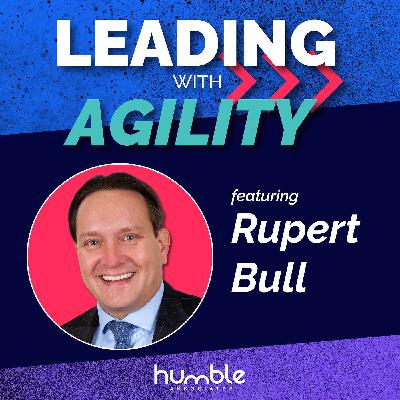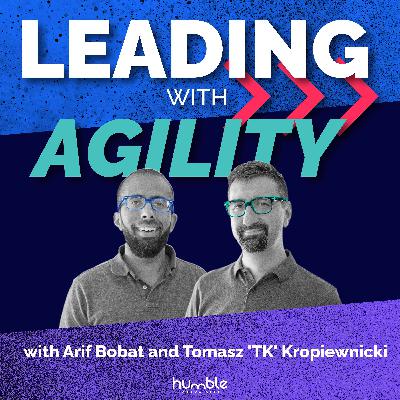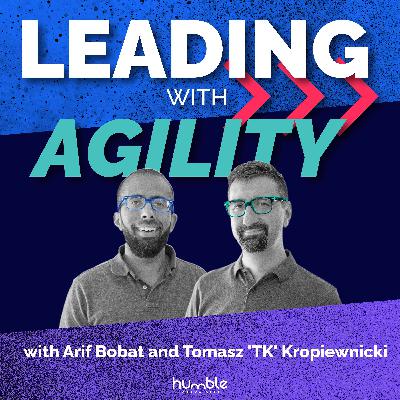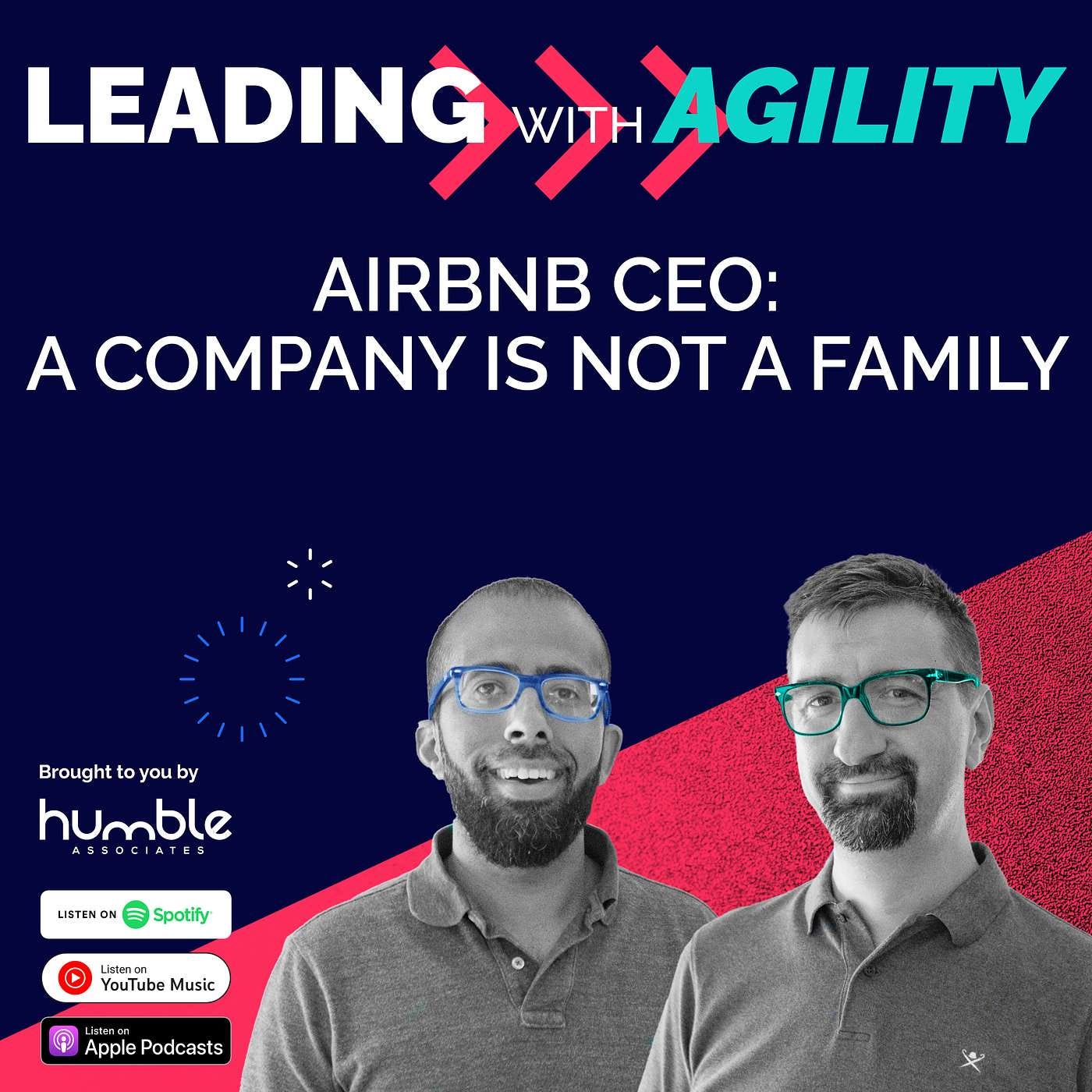Discover Leading with Agility
Leading with Agility

Leading with Agility
Author: The show that uses the world around us to explore how Leadership can be inspired by Agility
Subscribed: 5Played: 101Subscribe
Share
© Humble Associates
Description
If you're looking for something dynamic, fresh with a new perspective on leadership then this podcast is for you.
We believe that leadership is at a crossroads, not only are organisations struggling with constant change and disruption but leaders are looking for better and more effective development opportunities.
Which is why Agile leadership requires leaders to be more self-aware, comfortable with uncertainty and above all far more outcome focused than before.
So join our podcast, as we explore a new model of leadership that places Agile at its core.
Both Arif Bobat and Tomasz 'TK' Kropiewnicki are co-founders of Humble Associates and experienced leadership coaches and Agile consultants. For many years, they've helped transform organisations to adopt Agile ways of working while also supporting and guiding leaders through the process. Since forming Humble Associates they have been focused on coaching and developing leaders to lead with Agility.
leadingwithagility.substack.com
We believe that leadership is at a crossroads, not only are organisations struggling with constant change and disruption but leaders are looking for better and more effective development opportunities.
Which is why Agile leadership requires leaders to be more self-aware, comfortable with uncertainty and above all far more outcome focused than before.
So join our podcast, as we explore a new model of leadership that places Agile at its core.
Both Arif Bobat and Tomasz 'TK' Kropiewnicki are co-founders of Humble Associates and experienced leadership coaches and Agile consultants. For many years, they've helped transform organisations to adopt Agile ways of working while also supporting and guiding leaders through the process. Since forming Humble Associates they have been focused on coaching and developing leaders to lead with Agility.
leadingwithagility.substack.com
47 Episodes
Reverse
Text us to share your thoughts In this fascinating conversation we have a chat with Riccardo an expert storyteller who shares his background and why he fell into storytelling and its importance on leadership Here are the key talking points from our conversation:🤩 How relaying facts and figures can be transformed into compelling stories that generate emotions and create memories🎭 The core components of an ideal story: why you need a protagonist, moments that create emotions and obstacles that the protagonist overcomes. 🧇 Examples of real-life storytelling, and how to avoid waffling and why practice makes perfect🏋🏽♀️ Why leaders must develop a storytelling skill to create impact and generating empathy, understanding and closeness with your employees👹 How Lego Serious Play can enhance your storytelling techniques and why ChatGPT creates peril for storytellersGuest bioRiccardo Ginevri is a seasoned professional with over 20 years of experience in Technical Project Management. But his journey took an exciting turn when he realised that his true superpowers lie not in technical expertise but in playfulness and the art of storytelling. As a storytelling coach and public speaking expert, Riccardo brings a unique perspective to leadership—one that emphasises connection, creativity, and emotional resonance.An active member of Toastmasters International, Riccardo is passionate about public speaking and has held various roles where he mentors others in honing their communication skills. Through his engaging coaching style, Riccardo guides leaders to tap into their authentic stories, making them more relatable, memorable, and impactful.To learn more about Riccardo and his work, connect with him on LinkedIn. Visit our website www.humble.associatesOr check out our LinkedIn page to learn more about Humble Associates This is a public episode. If you would like to discuss this with other subscribers or get access to bonus episodes, visit leadingwithagility.substack.com
We sit down with Dr Meish-Ann for an insightful and eye-opening conversation about the role of leaders when it comes to employee engagement, wellbeing and stress. She breaks down her latest research that reveals uncomfortable truths for managers and leaders in any organisation. Simply showing up and being present for line reports isn't enough and far more is required.Here are the key talking points from our conversation❤️🩹 Why check-ins are critical to employee wellbeing and the need for pro-active behaviours from managers. And how regular check-ins improve psychological safety amongst employees.🏋♂️ Importance of strength-based hashtag#leadership and how employee recognition creates connectedness with colleagues, and greater trust.🤝 why feeling appreciated is core to employee wellbeing, especially happiness and loneliness in the workplace.5️⃣ The 5 elements of good, impactful recognition in the workplace. And why leaders must provide recognition in an authentic manner.🎓 Latest research reveals how the types of rewards matter and why combined with recognition they have a significant impact on employee retentionGuest bioMeisha-Ann has a PhD in Industrial/Organisational Psychology and has spentalmost twenty years as a researcher and practitioner. In her current role as VP of People Research at Workhuman, Dr. Martin is part of the Workhuman Consulting Practice. She provides analytics consulting to clients and prospects and works closely with the team focused on proving the impact of positive work experiences for individuals and organisations. She is considered a thought leader in this space and regularly speaks on topics like recognition, wellness, inclusion and psychological safety. She is a regular contributor to articles that have appeared in Forbes, Fortune, Bloomberg, HR Executive, HR Dive and Benefits Pro and was recognised by HR Executive as one of the Top 100 HR Tech Influencers.To learn more about Dr Martin and her work, connect with her on LinkedIn. And visit Workhuman's website to read her research papers Visit our website www.humble.associatesOr check out our LinkedIn page to learn more about Humble Associates This is a public episode. If you would like to discuss this with other subscribers or get access to bonus episodes, visit leadingwithagility.substack.com
Text us to share your thoughts We sat down with Paul Matthews to explore the current state of learning and where the role of reflection lies in creating more powerful experiences. In Paul's view, modern training experiences rely heavily on teaching content in a compressed time period without creating space for reflection. A provocative viewpoint perhaps? Join us to listen to the full episode, here's a summary of our key talking points:Power of reflection within learning. We talk about the NHS method of "see one, do one, teach one" How social media/mobile phone usage inhibits reflection as a practice and why the art of asking yourself constructive questions.The state of reflective practices within L&D, how to create the space for it in the workplace. The role of leaders in creating space for learning programmes by "showing the way forward" and the steps you need to take to create a successful learning journeyGuest bioPaul Matthews is one of the leading Learning & Development experts, with three best-selling books to his name. An accomplished keynote speaker, he speaks around the world on a diverse range of topics. He brings L&D to life with stories from his extensive travels that fascinate and inspire. He is known for reducing complex theory down to practical tools and sharing them in a way that everyone can use to get better results. As well as being a sought-after speaker, Paul provides consultancy services, training workshops and webinars for blue-chip clients in the UK and beyond.To learn more about Paul and her work visit, connect with him on LinkedIn. And visit his blog to read more about his 5 levels of reflection Visit our website www.humble.associatesOr check out our LinkedIn page to learn more about Humble Associates This is a public episode. If you would like to discuss this with other subscribers or get access to bonus episodes, visit leadingwithagility.substack.com
Text us to share your thoughts This week we're joined by Anamaria Dorgo, an expert community builder and founder of L&D Shakers, a large and growing community for Learning & Development professionals.We cover the power of communities within organisations, how studies have demonstrated the impact they can create for employees and employers but also more importantly why they are necessary in creating a sense of belonging.Here's a rundown of our key talking points from the episode:"These are my people". The power of communities in creating a sense of belonging for employees in an organisation. How shared lived experiences within a community creates trust and reciprocity. In turn creating greater connections between community members.Leadership responsibilities towards communities. Playing the role of gardener and nurturer."Facilitatitive leadership" and why it's a skill leaders need to build as the world of work changesHow to create a community in your own workplace, why understanding the needs of potential members is critical to its success. Guest bioAnamaria Dorgo is a Learning and Community Consultant, Facilitator, and Founder of Handle with Brain. She collaborates with organisations like Miro, Rituals, Sage, and Ogury to build internal communities and design collaborative, social, and memorable learning experiences.Anamaria also leads a global online community of practice for Learning & Development professionals called L&D Shakers, co-hosts Mapping Ties, and writes IRrEGULAR LEtTER.To learn more about Anamaria and her work visit, connect with her on LinkedInVisit our website www.humble.associatesOr check out our LinkedIn page to learn more about Humble Associates This is a public episode. If you would like to discuss this with other subscribers or get access to bonus episodes, visit leadingwithagility.substack.com
Text us to share your thoughts What's it like being a senior Black leader in an organisation but not realising you hold privilege in that position? This was Collin's experience and the basis of our conversation, a fascinating exploration of what it means to be a POC in a senior leadership role today. Collin reveals the impact of a post BLM era and how expectations on leadership for change has affected him, a revealing conversation which you definitely don't want to miss.Some of our key talking points:Not appreciating that you hold a position of privilege irrespective of your colour or background. That you are being seen as a role model without you knowing.What's the implication of being a role model? How does it affect your leadership stance? It's important to focus on what's achievable in your sphere of control. Otherwise it can be overwhelming!Are there risks to publishing diversity data? Could it affect people's perceptions of why they've been hired. Transparency is always important and changing the system requires courage.Getting external support with DEI efforts needs to be treated with care but much needed expertise to hold space for all viewpoints within an organisation is equally important. Guest bioCollin spent the last 11 years at ustwo, an award-winning a digital product studio. He has been a member of their Executive leadership team for the last 9. He has recently left ustwo to start his independent consulting practice. His focus is on helping teams and organisations radically improve their capability to create and delivery digital products. During almost 30 years of industry experience, working in London, New York, Tokyo, Bangalore and San Francisco, he’s helped organisations like Three, Sky, JPMorgan, HSBC, and Nissan, as well as start ups, to create cultures where people can thrive in their work. He advises and trains senior leadership teams to support their adoption and use of modern ways of working. He even wrote a book about it called Make Learn Change.To connect with Collin and learn more about his work visit his website and connect with him on LinkedInVisit our website www.humble.associatesOr check out our LinkedIn page to learn more about Humble Associates This is a public episode. If you would like to discuss this with other subscribers or get access to bonus episodes, visit leadingwithagility.substack.com
Text us to share your thoughts This week we don't have a guest, but we do have a topic that TK's been thinking about for a while. The unpredictable and unconventional journeys our careers take, and more importantly how this affects the nature of work within organisations.So many CEOs and business leaders in the world today have taken non-linear paths to reach where they've got to in their careers - How the future of work is changing, hiring for skills will be a future priority for organisations, at the expense of specific role definitions.- The importance of taking ownership of your career direction, positioning yourself for success.- Tensions between generations in the workforce and the impact of AI on hiring decisions.- How models like Ikigai can help you figure out what you'd like from your career going forward.- How taking risks with your career direction is a very personal personal choice, Arif reflects on his own story.And you can learn more about Ikigai here, and Gartner's Human Deal framework here.Download the episode now to learn more!Visit our website www.humble.associatesOr check out our LinkedIn page to learn more about Humble Associates This is a public episode. If you would like to discuss this with other subscribers or get access to bonus episodes, visit leadingwithagility.substack.com
This week we host Carolyn Shepherd, an AI expert, Author, HR professional and author of the 'ChatGPT Advantage' who is leading the charge to equip organisations to adopt AI tools. She's also the founder of Emmeline AI through which she delivers her expertise.The free-flowing conversation meant we covered a great deal around ethics, merits and the value of AI to organisations, specifically in the world of HR. Key discussion points include:Is AI here to replace work or will it augment roles?How Carolyn has leveraged AI to boost her own productivity How AI is disadvantaging women and how sh'es helping to address the gender imbalancesHow to make AI more accessible for everyoneA fantastic conversation all round with so many inisghts to draw from!Guest BioFounder, Emmeline AI | Host, Emmeline Odysseys a safe space for non-tech women to get comfortable with AI. LinkedIn Top Voice: Mentoring and Change Management. 20+ years as a tech enthusiast and domain specialist in HR, law, and the white knuckle end of entrepreneurship.Carolyn empowers professionals to harness AI confidently by prompt engineering for job security and career advancement, productivity boosts and cost savings.Carolyn also built a LinkedIn Training titled: 'Demystifying AI: Boost Your Confidence at Work.'To learn more about Carolyn, feel free to connect with her via LinkedIn.Or to find out more about her work, visit her webiste, Emmeline AI.Her book, 'The ChatGPT Advantage' can be found on Amazon.Visit our website www.humble.associatesOr check out our LinkedIn page to learn more about Humble Associates This is a public episode. If you would like to discuss this with other subscribers or get access to bonus episodes, visit leadingwithagility.substack.com
This week we're joined by Ceri Newton-Sargunar, an expert behavioural coach who specialies in supporting engineering leaders transition from being a technical expert to an effective people manager.Key discussion points include:The differences between Introversion vs Extroversion when exploring what makes successful leadersHow neurodiversity in Engineering leaders affects leadership effectivenessThe impact of raising self-awareness through coachingSupporting Engineering leaders to improve their emotional awarenessNew research that shows how our brain is actually growing right up until we die!Referenced academic research:Research paper: Personality Dimensions and Temperaments ofEngineering Professors and StudentsThe Effects of Personality Type on Engineering Student Performance and AttitudesGuest BioCeri is a Behavioural Coach, an ex-teacher and a Neuroscientist-in-training, with just under a decade of hands-on agile experience. She enjoys putting research into practice with colleagues, agile coaches, technical leadership and her teams. She has worked in the public and private sector, with large organisations, SMEs and start-ups, and now coaches and trains agile teams and agile professionals looking to improve their ways of working.Tea in-hand, she loves helping fellow professionals focus on, and make real strides with individuals and their interactions. Favourite pastimes include creating lightbulb moments, turning assumptions on their heads, and reading literally everything in front of her (because ADHD). Ceri also loves brains, but not in *that* way.To learn more about Ceri, feel free to connect with him via LinkedIn.Visit our website www.humble.associatesOr check out our LinkedIn page to learn more about Humble Associates This is a public episode. If you would like to discuss this with other subscribers or get access to bonus episodes, visit leadingwithagility.substack.com
This week we're joined by Rupert bull, an experienced Environmental, Social and Governance (ESG) professional and CEO of The Disruption House, an ESG consultancy.We discuss a range of issues, including:Why C-Suite leadership must demonstrate authenticity when implementing ESG policies.How leadership must reflect wider societal concerns around sustainability and other social issues if they are to retain talent.What it means to ethically run a business and how we can learn from "Quaker Capitalism". Leadership lessons from the Army, how it has influenced Rupert's beliefs in sustainably run organisations.So tune in to listen to the full discussion with Jag and discover his insights to being a senior leader leading change!Guest BioRupert is the CEO and Co-Founder of The Disruption House. He is passionate about driving sustainable and resilient growth in our Clients in the UK, Europe, the Middle East and beyond. Outside of work, he is a Charity Trustee and sponsored their first Social Impact Investment in a VC-run fund to explore how technology can be a force for good and scale the results for Philanthropic organisations. Rupert also served as a Captain for the Blues and Royals in the British Army.To learn more about Rupert ,feel free to connect with him via LinkedIn, or visit https://thedisruptionhouse.com/ to learn more about his workVisit our website www.humble.associatesOr check out our LinkedIn page to learn more about Humble Associates This is a public episode. If you would like to discuss this with other subscribers or get access to bonus episodes, visit leadingwithagility.substack.com
What does it mean to be a leader responsible for transforming a legacy auto manufacturer to adopt an entirely new way of working?In this discussion with Jag Johal, he opens up about his journey and shares some of the perosnal challenges he's faced as he's transitioned from a role in HR to leading a trasnformation effort towards Agile ways of working.We discuss how:He's created a why of change amongst senior leaders at JLRHaving so many ideas and struggling to put them into practice can leave people feeling unsettledimportant it is to be vulnerable and open to feedback as a leaderself-awareness and humility is crucial to leverage the team's skills in making decisionsSo tune in to listen to the full discussion with Jag and discover his insights to being a senior leader leading change!Guest bioJag has been with JLR for over twenty years. joining as a grduate and for the majority of that time, working in HR, working with all parts of the business across multiple locations. For the last couple of years he has transitioned into the space of leading on their agile transformation, which has been a huge learning curve. It has been great way to learn new skills, methods and techniques, and be able to contribute to their overall transformation journey.To learn more about Jag, feel free to connect with him via LinkedIn.Visit our website www.humble.associatesOr check out our LinkedIn page to learn more about Humble Associates This is a public episode. If you would like to discuss this with other subscribers or get access to bonus episodes, visit leadingwithagility.substack.com
In this fascinating episode with Elina Koussis, we discuss in depth how she has worked to create learning cultures that span the traditional classroom environment. For many of us, training interventions require time spent in classroom environments, whether virtual or in-person. Elina offers us a different viewpoint, which is that learning is a constant endeavour and in this episode she describes what this looks like. From learning communities to virtual learning environments and bespoke interventions such as female leadership programmes. We also discuss how learning patterns have changed post Covid, with the increased adoption of virtual learning environments and even gamified learning techniques coming to the fore.So join us for an insightful discussion about how to create a learning culture that works.Elina's BioElina is a global leadership development learning leader at Maersk and her expertise is for all things virtual – designing and delivering transformational virtual experiences and enabling virtual teams to stay connected and productive. Elina grew up in Greece, studied Biology and Psychology, Cornell University (USA) and since her Master’s in HR, London School of Economics, she lives in the UK. After a few years working in mental health, Elina turned to the corporate world and worked at BP, GE and now at Maersk. She has been building an HR career spanning 25 years in business partnering and leadership development roles and she is Fellow with the UK Chartered Institute of Personnel and Development (CIPD).Find out more about Elina by visiting her LinkedIn profileVisit our website www.humble.associatesOr check out our LinkedIn page to learn more about Humble Associates This is a public episode. If you would like to discuss this with other subscribers or get access to bonus episodes, visit leadingwithagility.substack.com
In this week's episode we sat down with Dr Benjamin Ritter, an experienced talent professional and leadership coach to discuss what it really takes to step up and take on the role of leader or manager. Too often he comes across managers who are struggling with the burden of people management, or are fearful about taking it on. In many cases they aren't comfortable being in a position of such responsibility but don't know how to speak up. Which is why in Dr Ritters view, organisations must offer options and possibilities beyond the typical people management expectations.So join us as Dr Ritter walks us through how leaders need to face their fears and be open about what they want, don't want and why they shouldn't suffer in silence. You can find out more about Dr Benjamin here and buy his book hereVisit our website www.humble.associatesOr check out our LinkedIn page to learn more about Humble Associates This is a public episode. If you would like to discuss this with other subscribers or get access to bonus episodes, visit leadingwithagility.substack.com
This week we're joined by Kim Faura, a highly experienced C-Suite leader who's experience working at well-known brands such as giffgaff and Checkatrade meant for a fascinating conversation about his thoughts on leadership.Kim talks us through his ideas on what skills managers need to adopt in order to progress up the leadership ranks. Specifically, the need to be strategic in outlook through what he describes as 'deep curiosity'. We explore what this means and how leaders can demonstrate this in order to progress. Finally, we also discuss the importance of creating an outcome based culture, how leaders must create this and the benefits it can create for organisations and employees alike. Ultimately, Kim agrees that while servant leadership and a collaborative approach to leadership is required, a good leader is one who "cares personally and challenges directly". A fascinating discussion indeed. Join us and be prepared to be challenged by Kim's thoughts on leadership. Guest BioKim Faura, an experienced Chief Marketing & Product Officer at both Checkatrade and prior to that, at Giffgaff. The Telecoms disruptor. Kim is currently doing consultancy work for both Telecommunications and Marketplace businesses. He’s originally from Barcelona, Kim has been in London for 15 years since the Launch of giffgaff.Kim's 10 lessons after leaving giffgaff:https://www.linkedin.com/pulse/top-10-lessons-learned-giffgaff-kim-faura/ Visit our website www.humble.associatesOr check out our LinkedIn page to learn more about Humble Associates This is a public episode. If you would like to discuss this with other subscribers or get access to bonus episodes, visit leadingwithagility.substack.com
This week we're joined by Rebecca Smart, ex-CEO of the world famous DK Books and now a leading Leadership and Talent Coach as we sat down with her to talk about all things coaching. Specifically, what does it mean for managers trying to adopt a coaching stance in how they support their employees. How can managers at learn to adopt this skill effectively? And are there risks to this approach? We also discuss the challenges of coaching leaders, how self-awareness is a critical skill and the difference between coaching and mentoring for a manager. So if you're looking at leadership coaching for yourself or for your team, this episode is worth a listen! Guest BioRebecca is a global Leadership and Talent Coach at Penguin Random House, the world’s largest consumer book publisher. With over 30 years of experience as a publisher and publishing leader, Rebecca made the pivotal decision to transition into coaching in 2023, establishing herself as the company’s first fully dedicated internal coach.During her distinguished career, Rebecca has held the position of CEO in both large corporate divisions and small independent companies within book publishing, spanning multiple territories. Having served in various capacities as both a coach and a coaching client in her publishing and leadership roles, Rebecca has firsthand experience of the transformative power of coaching in shaping lives and careers.You can find out more about Rebecca by visiting her LinkedIn profileVisit our website www.humble.associatesOr check out our LinkedIn page to learn more about Humble Associates This is a public episode. If you would like to discuss this with other subscribers or get access to bonus episodes, visit leadingwithagility.substack.com
In this week's episode we're joined by Toby Sinclair, an accomplished Employee Experience Consultant to discuss how a change in HR attitudes is long overdue.Given attrition, retention and employee engagement are hot topics across all industries what more can HR do to improve the overall Employee Experience to reduce the overall noise factor? According to Toby the answer lies in taking an iterative, test and learn approach to dig deep and really shift the dial. Join us as we discuss his experiences, how his approaches have led to success and to hear his top tips on what you can do to improve the Employee Experience in your organisation.To learn more about Toby and his work visit his website at https://www.tobysinclair.com/ or find him on LinkedIn by searching 'Toby Sinclair'Visit our website www.humble.associatesOr check out our LinkedIn page to learn more about Humble Associates This is a public episode. If you would like to discuss this with other subscribers or get access to bonus episodes, visit leadingwithagility.substack.com
We kick off our 2nd Season of our podcast with this wonderful discussion with Magdalene Usikaro, CEO of the Music Relief Foundation.With a focus on young people, her charity does amazing work to support young people from disadvantaged backgrounds through the power of music. Join us as we talk to Magdalene about how she inspires young people, what leadership means as a CEO of a charity and much more.Visit https://music-relief.org/ to find out more about her charity.Visit our website www.humble.associatesOr check out our LinkedIn page to learn more about Humble Associates This is a public episode. If you would like to discuss this with other subscribers or get access to bonus episodes, visit leadingwithagility.substack.com
Text us to share your thoughts A huge thank you to ALL our listeners to our podcast, we couldn't have made it this far without youWe wanted to draw Season 1 to a close with a reflective episode talking about what we've learnt and enjoyed this year.We have exciting plans for Season 2 (coming soon!), please tune in to learn more. We promise you won't be disappointed :)Listen to our special episode now!Visit our website www.humble.associatesOr check out our LinkedIn page to learn more about Humble Associates This is a public episode. If you would like to discuss this with other subscribers or get access to bonus episodes, visit leadingwithagility.substack.com
Since handing over the reigns to Andy Jassy, increasing reports indicate that the one prized leadership culture within Amazon is starting to shift. Employees and former execs report that once unbroken rules are now becoming frayed around the edges, while others report that leadership principles have been weaponised against them.In this episode we discuss whether the culture so heavily associated with Bezos is slowly unravelling at Amazon and if it's such a bad thing after all?Take a look at out Amazon's leadership principles here, while you can read more about employees thoughts on the Andy Jassy era hereEnjoy the episode!Visit our website www.humble.associatesOr check out our LinkedIn page to learn more about Humble Associates This is a public episode. If you would like to discuss this with other subscribers or get access to bonus episodes, visit leadingwithagility.substack.com
As the summer holidays beckon, demands on employers increase. Whether its parents requiring greater flexibility or singletons wanting to spend more time outdoors with friends or at festivals. Regardless of needs, employees of all stripes will want the support of their organisation.In this week's episode we discuss how employers should approach these demands. And taking inspiration from one such leader, James Timpson, CEO of the Timpson retail chain we explore the various options open to leaders. So join us (and Arif's croaky, unwell voice), as we explore these issues in this week's episodeAnd if you want to learn more about James' inspirational leadership, then watch his interview with Channel 4 News' Krishnan Guru-MurthyVisit our website www.humble.associatesOr check out our LinkedIn page to learn more about Humble Associates This is a public episode. If you would like to discuss this with other subscribers or get access to bonus episodes, visit leadingwithagility.substack.com
Earlier this year in an interview with Adam Grant, Airbnb's CEO Brian Chesky revealed his regret at describing his company as a family during the COVID-19 pandemic.In this episode we go deeper into why Brian believes this is problematic. We'll look at how true it is. We'll also explore risks with this approach and what can be negative consequences for employees if this becomes overemphasised. Finally we'll discuss alternative approaches that may prove more effective and a bonus discussion on the benefits of group coaching to improve team relationships.Enjoy the episode! Visit our website www.humble.associatesOr check out our LinkedIn page to learn more about Humble Associates This is a public episode. If you would like to discuss this with other subscribers or get access to bonus episodes, visit leadingwithagility.substack.com
























